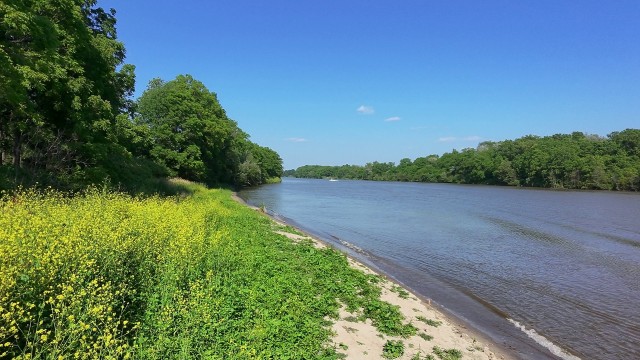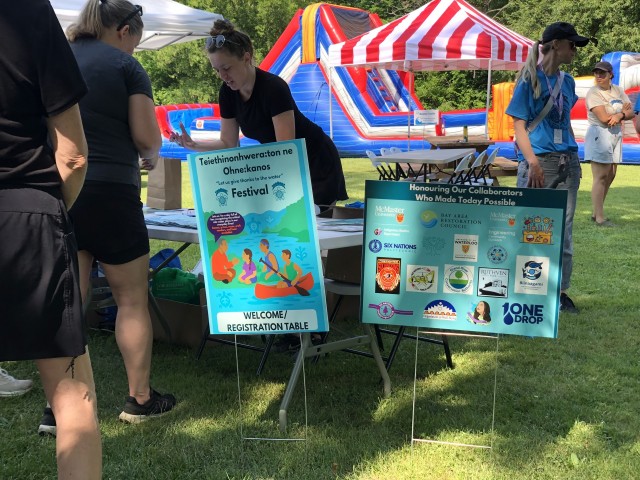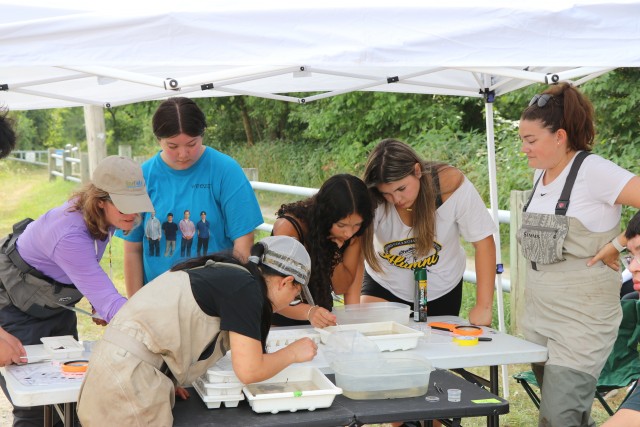Building a Pathway to Where the Water Flows

At Six Nations of the Grand River—the most populous First Nations community in Canada—water is more than a basic need. It is sacred, connecting health, land, culture, and future generations. Despite this, access to clean, safe drinking water remains a challenge for more than half of the community.
In 2025, the community responded by launching Project Ohahodǫ́gyeʔ tsęh Ohnegahdę́gyo—“a pathway to where the water flows.” Co-led by Six Nations Polytechnic in collaboration with McMaster University, Six Nations Health Services, and the One Drop Foundation, and guided by Elders, Knowledge Holders, and youth, the project brings Haudenosaunee knowledge together with science to strengthen water security. Through community gatherings that honour water, youth training in Science, Technology, Engineering and Mathematics (STEM), mobile water monitoring, and long-term planning, this project is building capacity and creating space for the community to define its own water future.
On July 3, 2025, Chiefswood Park buzzed with energy as nearly 400 community members gathered for a water celebration co-created by Six Nations of the Grand River, One Drop and local partners. Under the summer sun, kayak races splashed across the river, Elders shared stories that carried lessons from generations past, and over 20 booths showcased community initiatives that put water at the heart of life at Six Nations.

Teiethinonhwera:ton ne Ohne:kanos ("Let us give thanks to the water") Festival. Project Ohahodǫ́gyeʔ tsęh Ohnega̱hdę́gyo, One Drop Foundation. Credit: Hermann Lampron
“Water is essential. The whole point of the water festival is to educate people on the importance of water. Not just the actual water and the history behind it, but the cultural connection that Indigenous people have with water —how special it is, and how sacred it is.”
participant of the Teiethinonhwera:ton ne Ohne:kanos (Let us give thanks to the water) Festival and Six Nations community member
From July 21-25, fifteen students and three youth leaders from Six Nations embarked on the first-ever water stewardship camp blending Traditional Ecological Knowledge (TEK) with STEM.
The week unfolded as a journey of discovery. It began at Six Nations Polytechnic and continued on McMaster’s campus, where youth navigated water challenges through both cultural teachings and scientific practice. They collected and analyzed water samples, joined medicine walks guided by Elders, experimented with 3D printing, and gazed at the stars in McMaster’s W.J. McCallion Planetarium. Elders, Knowledge Holders, and scientists supported each step, shaping the next generation of water stewards.

Project Ohahodǫ́gyeʔ tsęh Ohnega̱hdę́gyo, Six Nations Polytechnic. Credit: Ryan Johnson.
Reliable, community-held data is essential for making decisions that safeguard health, land, and culture. To support this, the project is establishing a mobile water monitoring lab at Six Nations of the Grand River — a hands-on space where community members can conduct regular field testing, explore results, and use data to guide future planning and care for water.
Beyond the lab, community partners are co-developing a knowledge-sharing protocol to ensure results remain transparent, accessible, and aligned with Indigenous data sovereignty. By keeping water information in community hands and rooted in Haudenosaunee values of care and responsibility, the project is creating both capacity and confidence – empowering Six Nations to monitor, protect, and shape the future of its water.
Health, land, and water are inseparable within the Haudenosaunee worldview. Guided by this understanding, Project Ohahodǫ́gyeʔ tsęh Ohnegahdę́gyo unfolds as a multi-phase journey:
Phase 1 (2025–2026) is laying the foundation: launching a mobile water lab, training youth, and co-developing Haudenosaunee-led practices, while facilitating community dialogues to define shared priorities for clean and safe water access.
Phase 2 (2026 and beyond) will build on that groundwork to strengthen access to sustainable water services, exploring water infrastructure, such as community-designed wells, informed by Six Nations’ priorities and ongoing consultation with leadership.
As the project moves forward, Six Nations of the Grand River is charting its own water future—decisions rooted in ancestral teachings, guided by science, and led by the community itself. This journey is part of the Indigenous Water Allyship, which places Indigenous-led solutions at the heart of water security in Canada. We are grateful to the partners who make this program possible and who are committed to ensuring safe water for all.
In our quest to collaborate with like-minded organizations, foundations and companies who believe in the urgent need to address and change the systemic issues at the heart of clean water and climate challenges, we invite the Canadian community focused on sustainable water initiatives to contact Lauren Alcorn, Senior Director of Strategic Partnerships and Government Relations, to discuss learning and partnership opportunities.